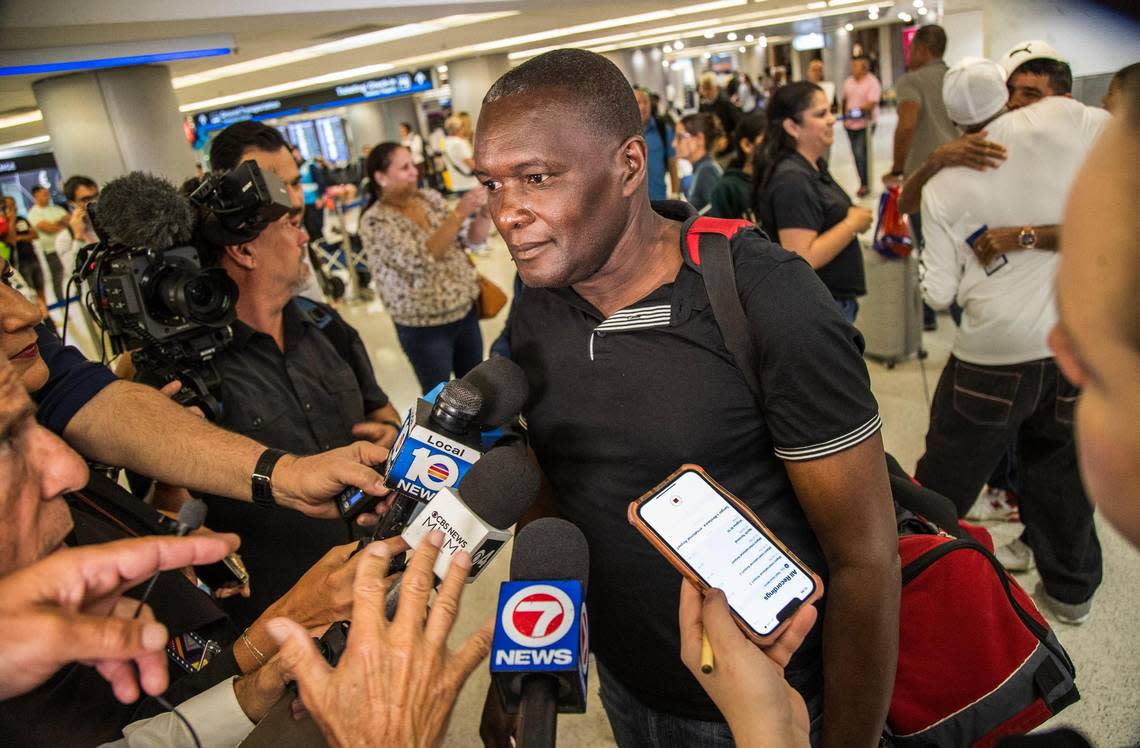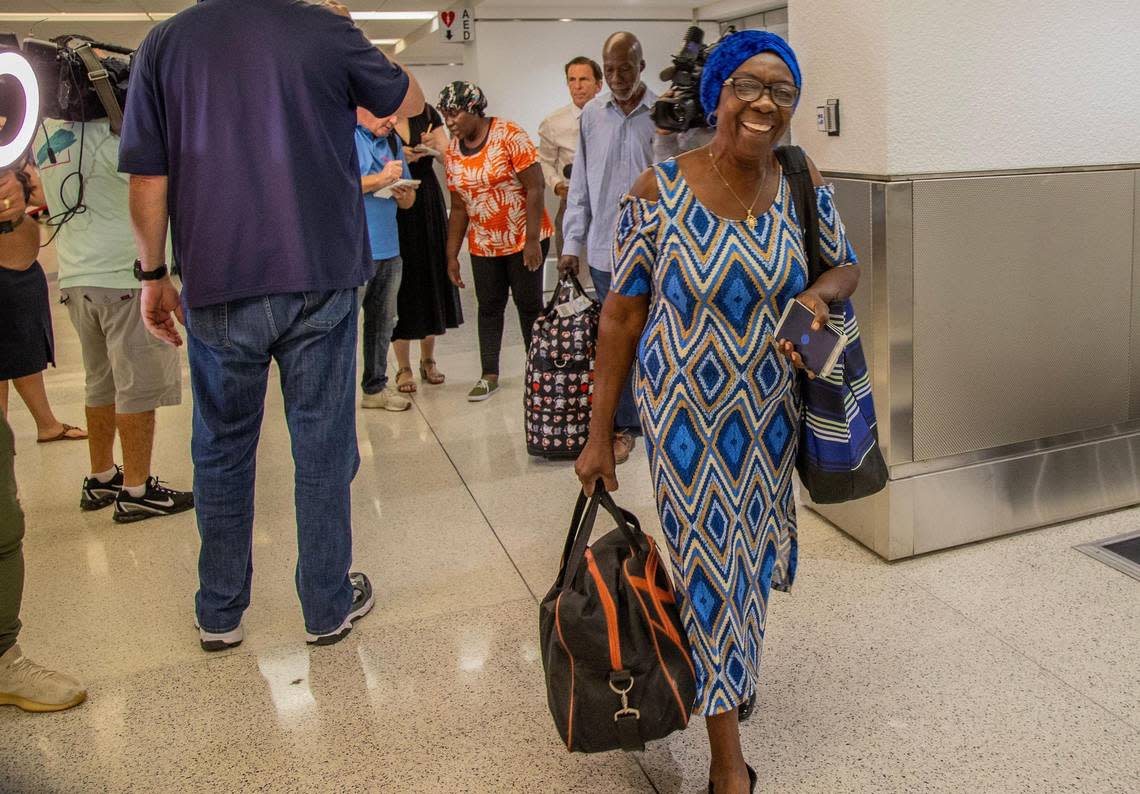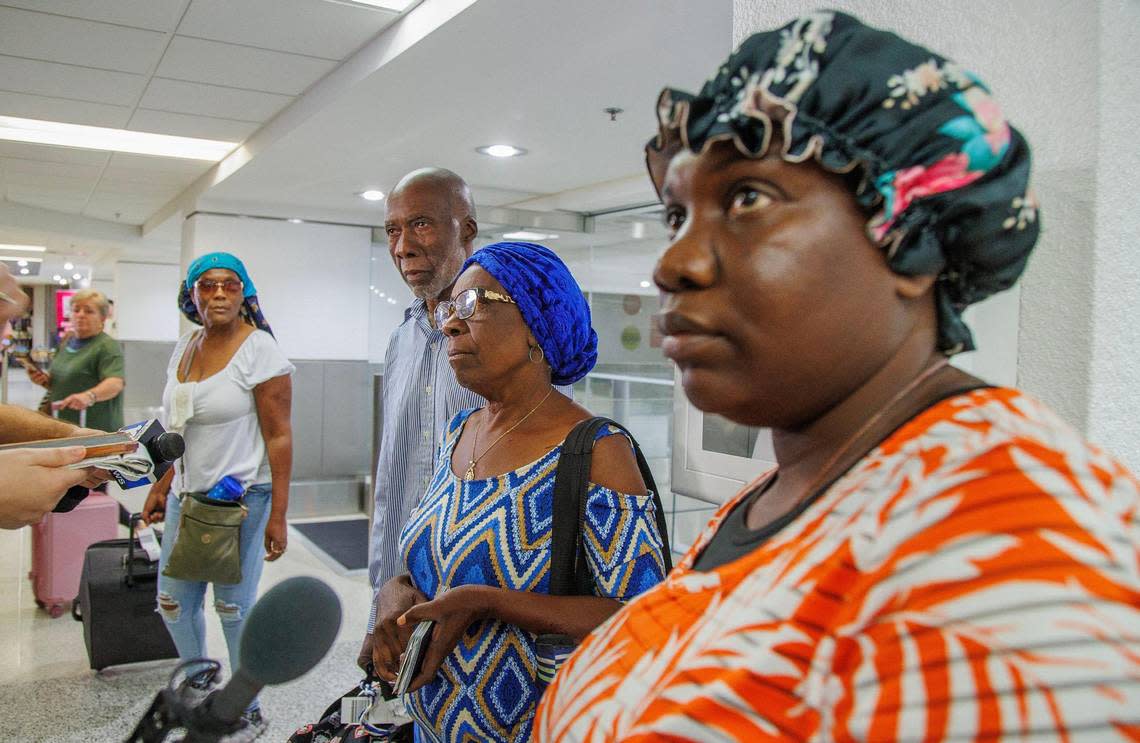Another flight of Americans trapped in Haiti arrives in Miami. U.S. hopes to get more out
The State Department flew more than 60 U.S. citizens trapped in Haiti into Miami International Airport on Thursday, the second evacuation flight to South Florida this week as extreme gang violence continues to threaten to topple the country’s government.
This time the flight, which departed from Cap-Haïtien, had passengers who had been staying in the northern port city and also others who were in the gang-ridden capital, six hours south. One passenger said he first traveled by helicopter in order to avoid the capital’s gang-controlled roads, which have made it impossible for people to flee the rampage.
“The situation is very bad,” Gaston Desir said shortly after landing at MIA.
Commercial flights from major U.S. carriers between Haiti and the United States have been halted since March 4, when armed groups targeted the Toussaint Louverture International Airport, along with the nearby seaport.
On Thursday, White House Press Secretary Karine Jean-Pierre emphasized that Haiti has been under a Level 4 “Do Not Travel” warning since 2020 “precisely because of the ongoing instability caused by the gangs.
“We’ve been stressing that the United States government cannot guarantee American citizens will all be evacuated given the treacherous situation on the ground,” she said. “That said, we have informed Americans who are registered with the State Department that we’re exploring various options to help them depart from Port-au-Prince and also from Cap-Haïtien.”

In addition to flying U.S. citizens out of Haiti’s northern city, which hasn’t seen the same level of violence as the capital, Jean-Pierre said the U.S. government on Thursday afternoon also moved 15 American citizens on helicopters from Port-au-Prince to Santo Domingo, the capital of the neighboring Dominican Republic.
“As circumstances permit, we’ll be able to repeat this,” she said. “We hope to be able to repeat this in coming days.”
Leaving without words
Some 30 U.S. citizens first landed in Miami’s airport from Haiti on Sunday. The flights are part of the federal government’s efforts to get U.S. citizens to safety.
“Our focus is to get as many U.S. citizens out of Haiti to a safe location where we can provide further assistance, as needed and appropriate. At this time, we are prioritizing U.S. citizens for these U.S. government organized flights,” an administration official told McClatchy in a statement.
READ MORE: U.S. begins evacuating its citizens by helicopter out of gang-torn Port-au-Prince
A State Department official told the Herald that the U.S. hopes to be able to take as many as 30 Americans every day to Santo Domingo on helicopters. Florida Gov. Ron DeSantis also announced on Wednesday that Florida had also successfully evacuated 14 Floridians from Haiti to Orlando.
Tania Diogene, who is Haitian American and has lived in the U.S for 15 years, said she had traveled to Haiti to visit her mother. She arrived there on March 1, the day before gangs orchestrated a mass prison break at the country’s two largest detention centers in the capital, freeing thousands of inmates, including several notorious gang leaders. The attacks were followed by an escalation in violence that made it impossible, Diogene said, to reunite with her mother. Her mom remains in Port-au-Prince, said Diogene, who was already in Cap-Haïtien when she heard about the U.S. government flight.
“They canceled my flight so I got stuck over there,” said Diogene. Conditions in Haiti, she said, are “really bad.” The price of food is skyrocketing and the sounds of gunfire, even in Cap-Haïtien, are startling.

As the group that arrived at MIA on Thursday was getting off their flight, the United Nations resident coordinator and chief humanitarian for Haiti, Ulrika Richardson, issued a plea for help. She said the situation has gone from “very worrying to extremely alarming,” and Haitians and others were feeling a sense of “terror” at the constant attacks.
“What we have here in Haiti is a humanitarian crisis of quite profound magnitude,” she said. “Daily life for many, in fact for all of us in the capital, is really defined by one of roadblocks, the sound of gunshots and… let’s say lots of tensions on the streets.”
READ MORE: Long ordeal of disabled, abandoned kids in Haiti orphanage ends: They’re in Jamaica
At the beginning of the month, criminal gangs declared their intentions to overthrow Prime Minister Ariel Henry while he was away on a state visit to Kenya to finalize an agreement for the deployment of a multinational security force. That force remains on hold while the Kenya government awaits the finalization of a new transition government for Haiti after Henry, under pressure from the U.S. and its allies to resign, announced his intentions to step aside. A presidential panel, brokered by the Caribbean Community and the U.S., remains a work in progress. It will be tasked with naming a prime minister to replace Henry, readying the country to receive the mission and preparing for eventual elections.
Many of the passengers who arrived in Miami on Thursday said they had been in Haiti visiting loved ones when the armed groups took over police stations and attacked the main seaport and airport.
The flight arrived shortly before noon, and some family members were already waiting for their loved ones. One woman, who declined to be named, said she was waiting for her mother to arrive. One passenger said there were families and a “couple of children” on board.

READ MORE: U.S. begins evacuating its citizens by helicopter out of gang-torn Port-au-Prince
Wilson Joseph, who lives in Fort Lauderdale, said he had arrived in Cap-Haïtien toward the end of January, where he was visiting family. He had been happy to be there “because it is my country.” Then the violence broke out.
“I don’t like the way my country is, but if something can be changed, I’d be happy,” said Joseph.
Acephie Etienne, who is originally from Cap-Haïtien and has lived in the United States for 25 years, said that she had been visiting her hometown. Ashley Norilus, Etienne’s daughter, told the Herald that her sister had booked the flights for her and her parents two days ago.
She said there was not a lot of food in Cap-Haïtien, even if there was not the same level of gang violence like in Port-au-Prince. She told reporters that she was happy to get out.
“It was very scary.”
McClatchy Chief Washington Correspondent Michael Wilner contributed to this report.
